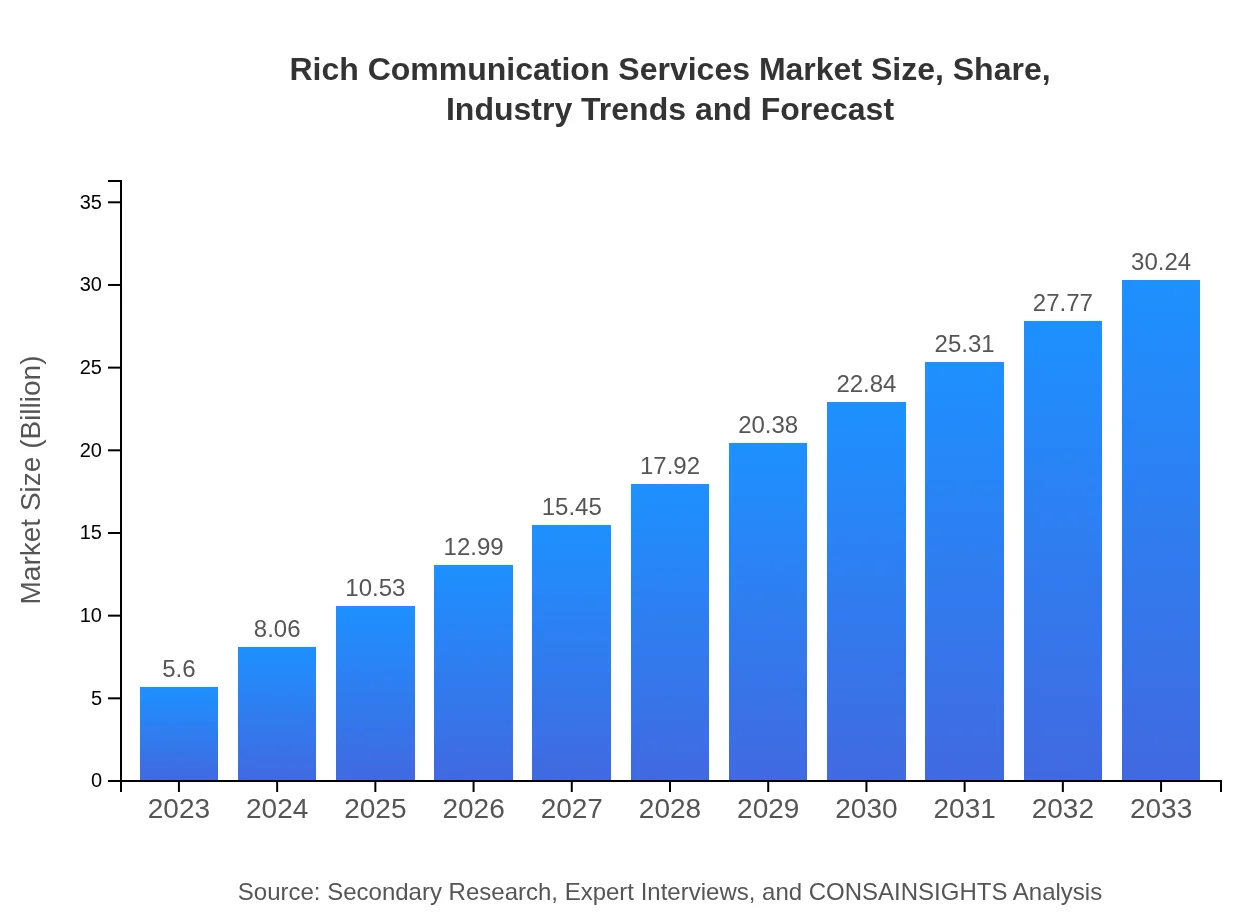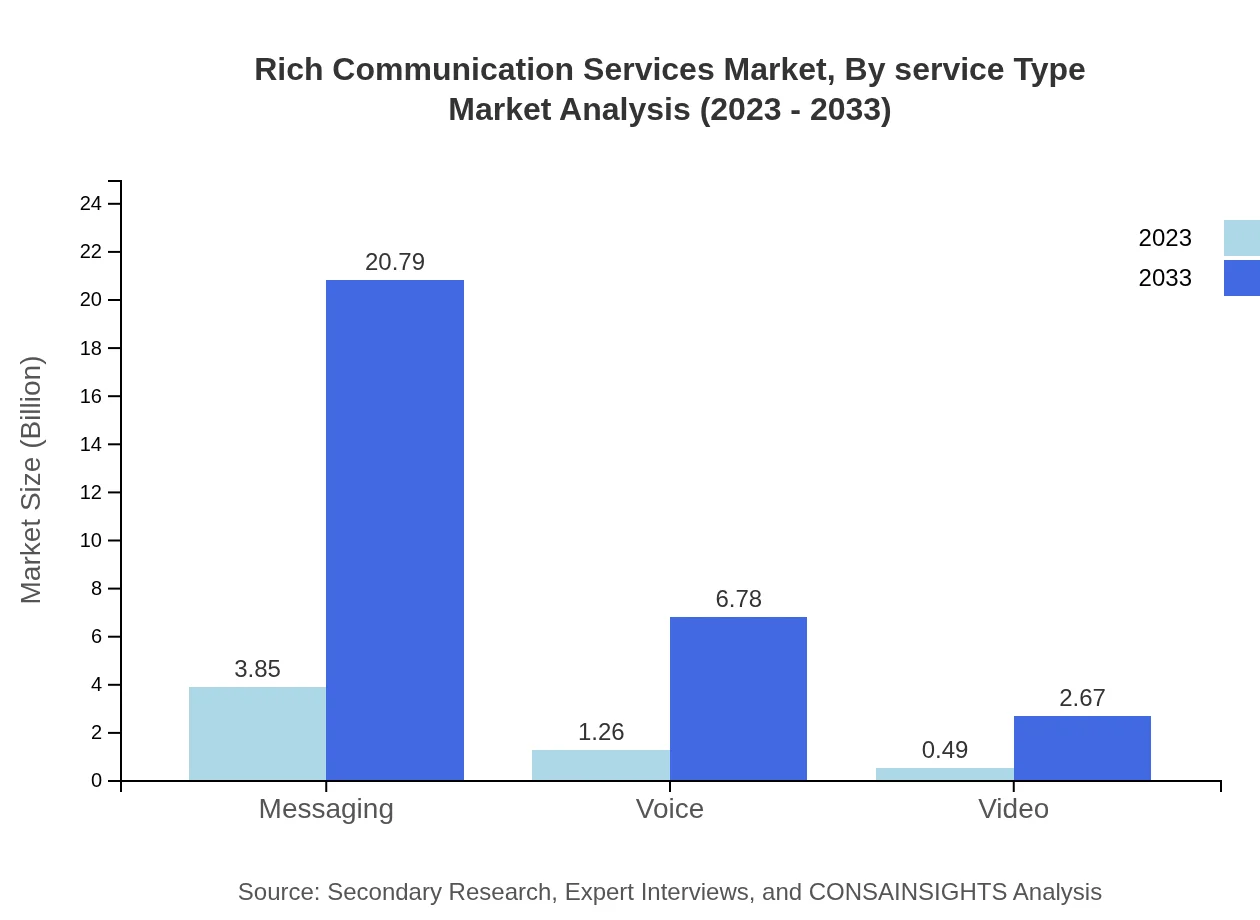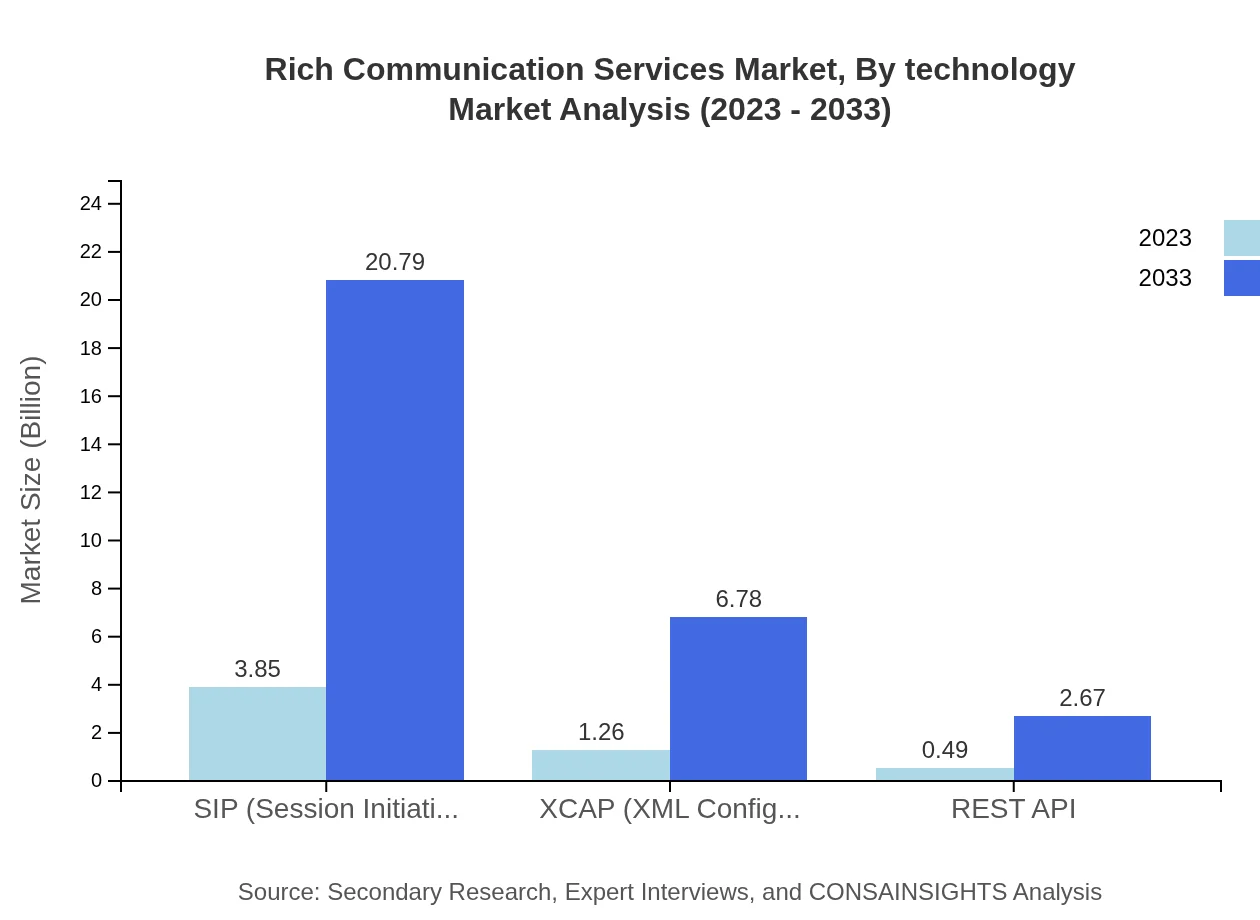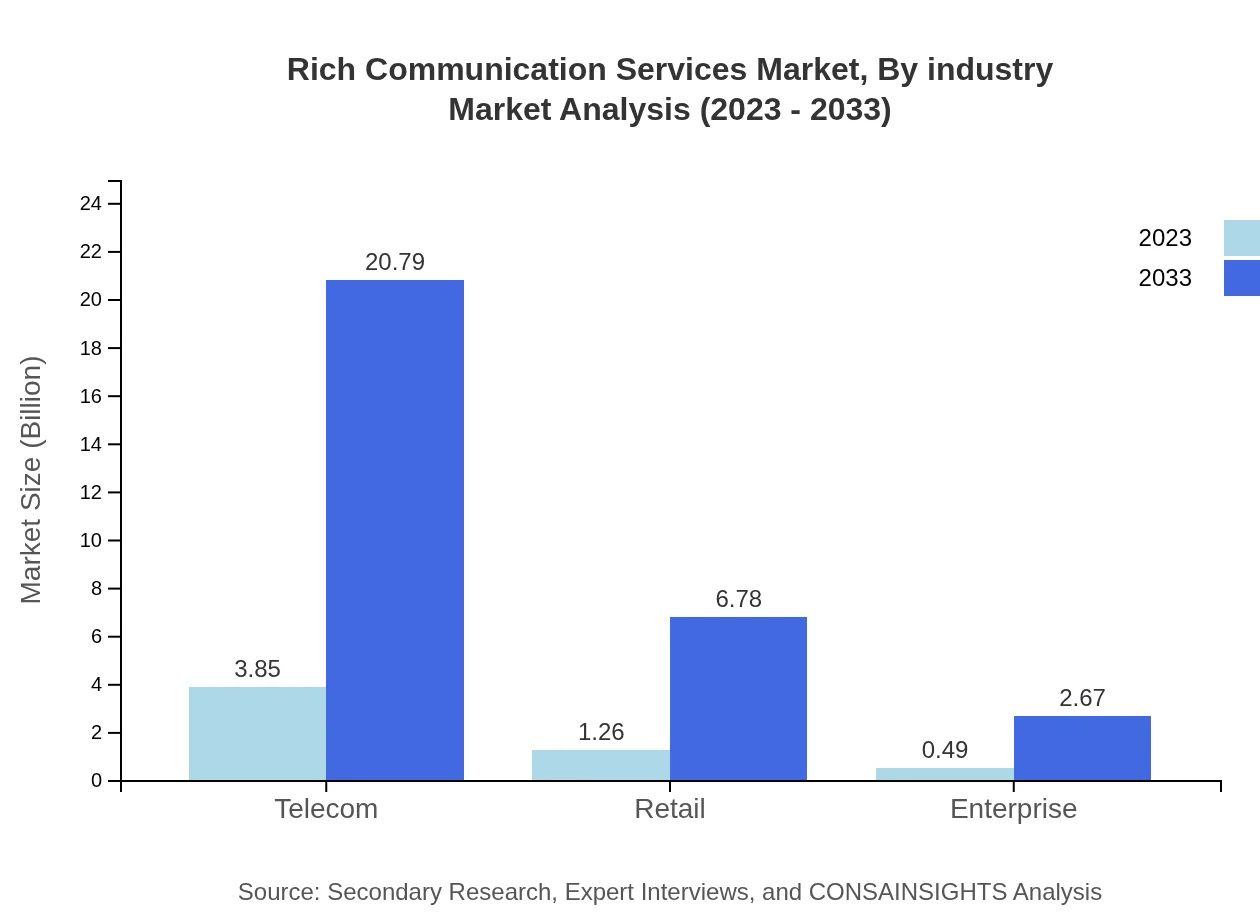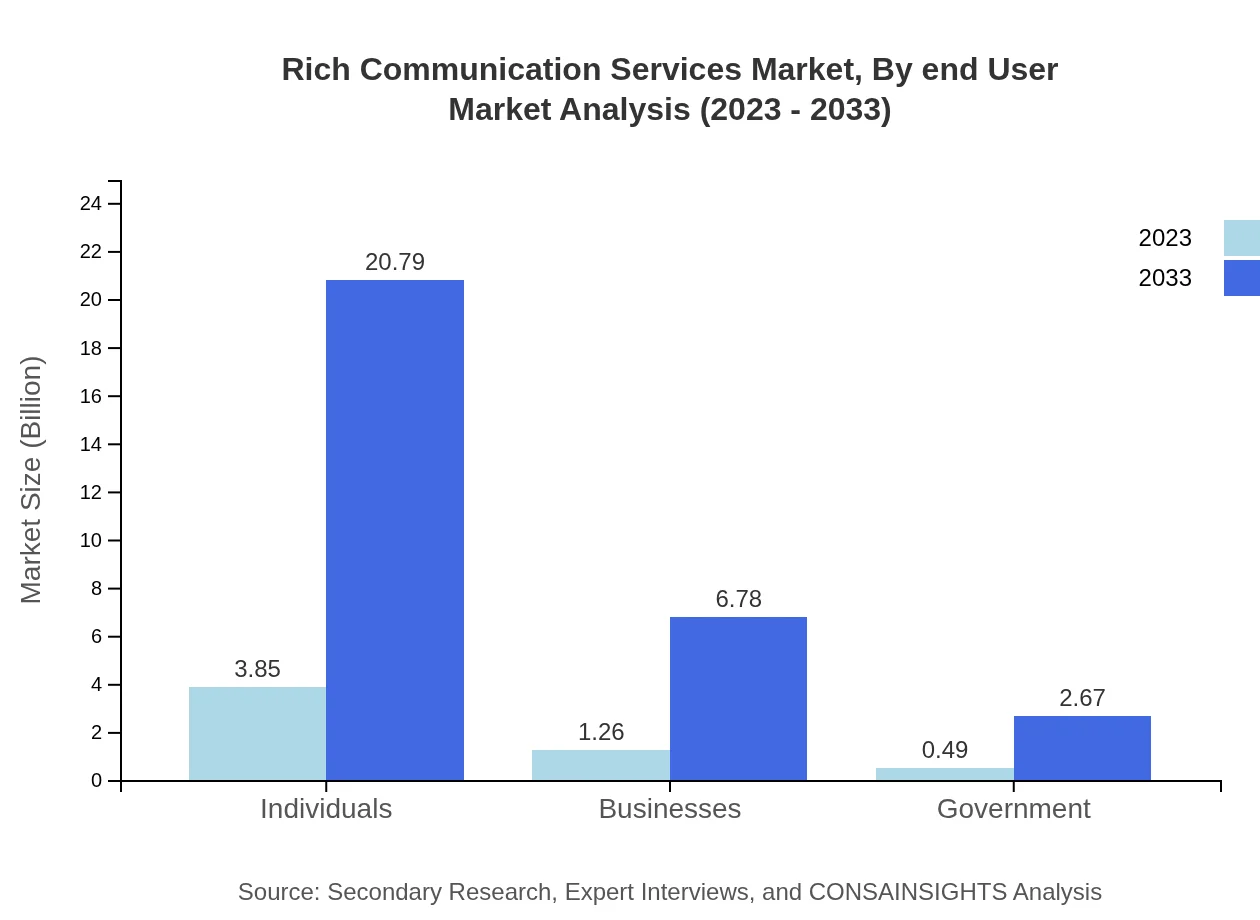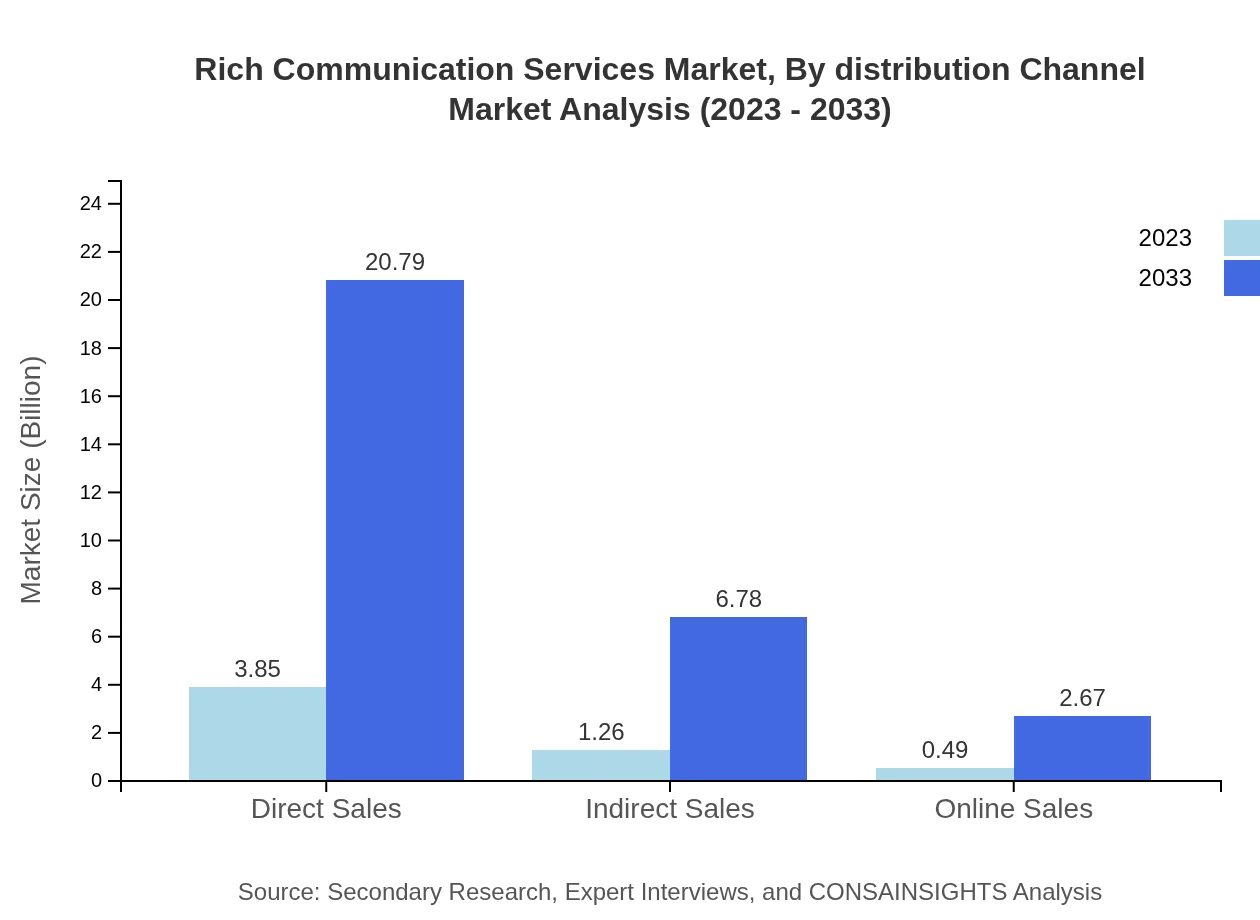Rich Communication Services Market Report
Published Date: 31 January 2026 | Report Code: rich-communication-services
Rich Communication Services Market Size, Share, Industry Trends and Forecast to 2033
This report provides a comprehensive analysis of the Rich Communication Services market, covering essential insights, trends, and forecasts from 2023 to 2033. It outlines market size, growth rates, segmentations, and regional analyses based on current data and future projections.
| Metric | Value |
|---|---|
| Study Period | 2023 - 2033 |
| 2023 Market Size | $5.60 Billion |
| CAGR (2023-2033) | 17.4% |
| 2033 Market Size | $30.24 Billion |
| Top Companies | Google, Vodafone Group, AT&T, Twilio |
| Last Modified Date | 31 January 2026 |
Rich Communication Services Market Overview
Customize Rich Communication Services Market Report market research report
- ✔ Get in-depth analysis of Rich Communication Services market size, growth, and forecasts.
- ✔ Understand Rich Communication Services's regional dynamics and industry-specific trends.
- ✔ Identify potential applications, end-user demand, and growth segments in Rich Communication Services
What is the Market Size & CAGR of Rich Communication Services market in 2023?
Rich Communication Services Industry Analysis
Rich Communication Services Market Segmentation and Scope
Tell us your focus area and get a customized research report.
Rich Communication Services Market Analysis Report by Region
Europe Rich Communication Services Market Report:
The European RCS market is projected to grow from $1.63 billion in 2023 to $8.81 billion by 2033, encouraged by increasing investments in digital communication solutions and rising customer engagement needs.Asia Pacific Rich Communication Services Market Report:
The Asia Pacific region is expected to witness significant growth, with a market size projected to reach $6.41 billion by 2033, up from $1.19 billion in 2023. The increase in smartphone users and digitalization trends are primary growth drivers.North America Rich Communication Services Market Report:
North America holds a significant market share, expected to expand from $1.82 billion in 2023 to $9.81 billion by 2033, driven by established telecom operators and high consumer demand for enhanced messaging services.South America Rich Communication Services Market Report:
The South American market is anticipated to grow from $0.50 billion in 2023 to $2.69 billion by 2033. This growth is fueled by an increasing number of mobile subscribers and the adoption of digital communication technologies.Middle East & Africa Rich Communication Services Market Report:
In the Middle East and Africa, the market is set to evolve from $0.46 billion in 2023 to $2.50 billion by 2033, propelled by improvements in telecommunications infrastructure and rising smartphone penetration.Tell us your focus area and get a customized research report.
Rich Communication Services Market Analysis By Service Type
The segmentation by service type showcases that individuals dominate the market, valued at $3.85 billion in 2023 and projected to reach $20.79 billion by 2033, holding a 68.75% market share. For businesses, the market is expected to grow from $1.26 billion in 2023 to $6.78 billion by 2033, accounting for 22.43%. The government sector, while smaller, will grow from $0.49 billion to $2.67 billion, indicating a growing trend for public sector engagement.
Rich Communication Services Market Analysis By Technology
By technology, Session Initiation Protocol (SIP) is seeing robust growth, projecting to rise from $3.85 billion in 2023 to $20.79 billion by 2033. Other technologies like REST API will grow from $0.49 billion to $2.67 billion, showcasing the technological adaptability of RCS.
Rich Communication Services Market Analysis By Industry
Analyzing the market by industry, telecom leads with substantial user adoption, projected to grow from $3.85 billion in 2023 to $20.79 billion by 2033, maintaining a 68.75% share. The retail and enterprise sectors are also growing with significant investments in RCS strategies, reflecting an increasing focus on customer interaction.
Rich Communication Services Market Analysis By End User
End-user analysis indicates that individuals represent the largest segment, with a market size anticipated to grow from $3.85 billion in 2023 to $20.79 billion by 2033. Businesses will also expand significantly, reflecting a continued trend towards interactive customer engagement.
Rich Communication Services Market Analysis By Distribution Channel
The distribution channel analysis reveals that direct sales are vital, with expectations of increasing from $3.85 billion in 2023 to $20.79 billion by 2033. Indirect and online sales are also growing but represent smaller segments in the overall channel landscape.
Rich Communication Services Market Trends and Future Forecast
Tell us your focus area and get a customized research report.
Global Market Leaders and Top Companies in Rich Communication Services Industry
Google:
A leading technology company driving the RCS initiative with its Messages app, focusing on enhancing user experiences through enriched messaging features.Vodafone Group:
A significant telecom operator implementing RCS into their messaging services, facilitating superior communication solutions for businesses.AT&T:
A major American telecommunications company providing RCS solutions that enhance customer engagement and optimize communications.Twilio:
A cloud communications platform that empowers businesses to integrate RCS into their customer interaction strategies, enhancing messaging experiences.We're grateful to work with incredible clients.









FAQs
What is the market size of Rich Communication Services?
The global market size of Rich Communication Services is projected to grow from 5.6 billion in 2023 to substantial growth by 2033. The market is expected to experience a robust CAGR of 17.4%, indicating significant expansion in the upcoming years.
What are the key market players or companies in the Rich Communication Services industry?
Key players in the Rich Communication Services market include prominent telecom companies such as AT&T, Vodafone, and Deutsche Telekom. These companies are at the forefront of integrating rich communication features in their offerings to provide enhanced customer experiences.
What are the primary factors driving the growth in the Rich Communication Services industry?
Key growth factors include the increasing adoption of smartphones, rising demand for enhanced messaging features, and the need for businesses to improve customer engagement. Additionally, technological advancements in mobile communication and the shift towards 5G networks are also contributing.
Which region is the fastest Growing in the Rich Communication Services market?
The fastest-growing region for Rich Communication Services is North America, with a projected market size of 9.81 billion by 2033 from 1.82 billion in 2023. Europe and Asia Pacific also show substantial growth rates, indicating broad global interest.
Does ConsaInsights provide customized market report data for the Rich Communication Services industry?
Yes, ConsaInsights specializes in providing customized market reports tailored to the Rich Communication Services industry. Clients can expect insights that meet their specific needs, focusing on market trends and segments relevant to their operations.
What deliverables can I expect from this Rich Communication Services market research project?
Deliverables typically include a comprehensive report covering market size, growth forecasts, segmentation data, competitive analysis, and regional insights. Detailed charts and infographics to visualize data trends may also be included for better comprehension.
What are the market trends of Rich Communication Services?
Current trends in the Rich Communication Services market show a focus on integrating messaging, video, and voice services into cohesive platforms. Additionally, the rise of AI-based communication solutions and the increasing importance of data security are shaping market dynamics.

